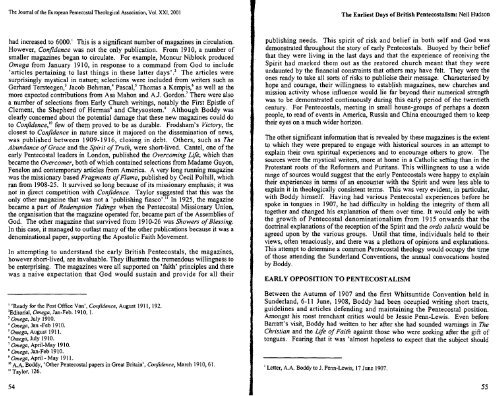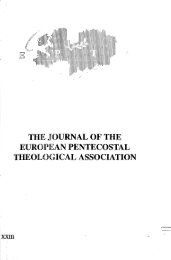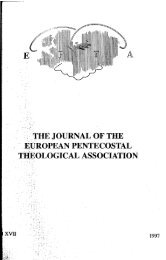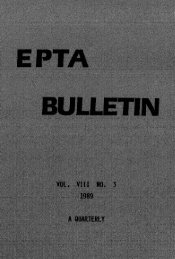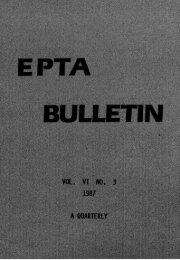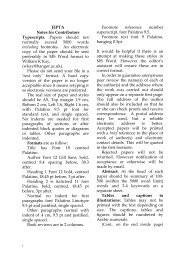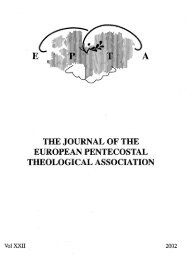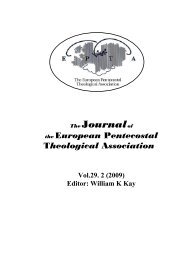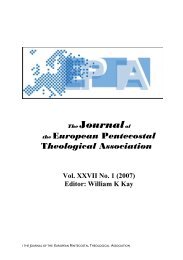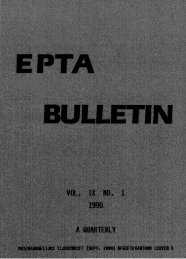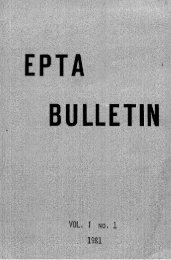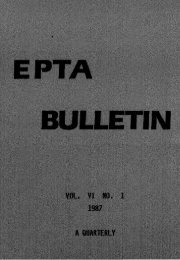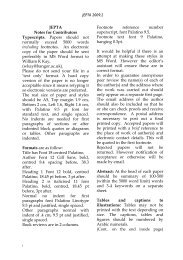jepta 2001 21 - European Pentecostal Theological Association
jepta 2001 21 - European Pentecostal Theological Association
jepta 2001 21 - European Pentecostal Theological Association
Create successful ePaper yourself
Turn your PDF publications into a flip-book with our unique Google optimized e-Paper software.
The Journal of the <strong>European</strong> <strong>Pentecostal</strong> <strong>Theological</strong> <strong>Association</strong>, Vol. XXI, <strong>2001</strong><br />
The Earliest Days of British <strong>Pentecostal</strong>ism: Neil Hudson<br />
had increased to 6000.' This is a significant number of magazines in circulation.<br />
However, Confidence was not the only publication. From 1910, a number of<br />
smaller magazines began to circulate. For example, Moncur Niblock produced<br />
Omega from January 1910, in response to a command from God to include<br />
'articles pertaining to last things in these latter days'.' The articles were<br />
surprisingly mystical in nature; selections were included from writers such as<br />
Gerhard Tersteegen,' Jacob Behrnan,' Pascal,' Thomas a Kempi~,~ as well as the<br />
more expected contributions from Asa Mahon and A.J. Gordon.' There were also<br />
a number of selections from Early Church writings, notably the First Epistle of<br />
Clement, the Shepherd of Hermass and Chryso~tom.~ Although Boddy was<br />
clearly concerned about the potential damage that these new magazines could do<br />
to Confidence,'' few of them proved to be as durable. Frodsham's Victory, the<br />
closest to Confidence in nature since it majored on the dissemination of news,<br />
was published between 1909-1916, closing in debt. Others, such as The<br />
Abundance of Grace and the Spirit of Truth, were short-lived. Cantel, one of the<br />
early <strong>Pentecostal</strong> leaders in London, published the Overcoming Life, which then<br />
became the Overcomer, both of which contained selections from Madame Guyon,<br />
Fenelon and contemporary articles from America. A very long running magazine<br />
was the missionary based Fragments of Flame, published by Cecil Polhill, which<br />
ran from 1908-25. It survived so long because of its missionary emphasis; it was<br />
not in direct competition with Conjidence. Taylor suggested that this was the<br />
only other magazine that was not a 'publishing fiasco'." In 1925, the magazine<br />
became a part of Redemption Tidings when the <strong>Pentecostal</strong> Missionary Union,<br />
the organisation that the magazine operated for, became part of the Assemblies of<br />
God. The other magazine that survived from 1910-26 was Showers of Blessing.<br />
In this case, it managed to outlast many of the other publications because it was a<br />
denominational paper, supporting the Apostolic Faith Movement.<br />
In attempting to understand the early British <strong>Pentecostal</strong>s, the magazines,<br />
however short-lived, are invaluable. They illustrate the tremendous willingness to<br />
be enterprising. The magazines were all supported on 'faith' principles and there<br />
was a naive expectation that God would sustain and provide for all their<br />
I 'Ready for the Post Office Van', Confidence, August 191 1,192.<br />
'Editorial, Omega, Jan-Feb. 191 0, 1.<br />
' Omega, July 191 0.<br />
' Omega, Jan -Feb 191 0.<br />
' Omega, August 19 1 1.<br />
'Omega, July 1910.<br />
' Omega, April-May 1910.<br />
' Omega, Jan-Feb 19 10.<br />
Omega, April - May 191 1.<br />
lo A.A. Boddy, 'Other <strong>Pentecostal</strong> papers in Great Britain', Confidence, March 1910,61.<br />
" Taylor, 126.<br />
publishing needs. This spirit of risk and belief in both self and God was<br />
demonstrated throughout the story of early <strong>Pentecostal</strong>s. Buoyed by their belief<br />
that they were living in the last days and that the experience of receiving the<br />
Spirit had marked them out as the restored church meant that they were<br />
undaunted by the financial constraints that others may have felt. They were the<br />
ones ready to take all sorts of risks to publicise their message. Characterised by<br />
hope and courage, their willingness to establish magazines, new churches and<br />
mission activity whose influence would lie far beyond their numerical strength<br />
was to be demonstrated continuously during this early period of the twentieth<br />
century. For <strong>Pentecostal</strong>s, meeting in small house-groups of perhaps a dozen<br />
people, to read of events in America, Russia and China encouraged them to keep<br />
their eyes on a much wider horizon.<br />
The other significant information that is revealed by these magazines is the extent<br />
to which they were prepared to engage with historical sources in an attempt to<br />
explain their own spiritual experiences and to encourage others to grow. The<br />
sources were the mystical writers, more at home in a Catholic setting than in the<br />
Protestant roots of the Reformers and Puritans. This willingness to use a wide<br />
range of sources would suggest that the early <strong>Pentecostal</strong>s were happy to explain<br />
their experiences in terms of an encounter with the Spirit and were less able to<br />
explain it in theologically consistent terms. This was very evident, in particular,<br />
with Boddy himself. Having had various <strong>Pentecostal</strong> experiences before he<br />
spoke in tongues in 1907, he had difficulty in holding the integrity of them all<br />
together and changed his explanation of them over time. It would only be with<br />
the growth of <strong>Pentecostal</strong> denominationalism from 19 15 onwards that the<br />
doctrinal explanations of the reception of the Spirit and the ordo salutis would be<br />
agreed upon by the various groups. Until that time, individuals held to their<br />
views, often tenaciously, and there was a plethora of opinions and explanations.<br />
This attempt to determine a common <strong>Pentecostal</strong> theology would occupy the time<br />
of those attending the Sunderland Conventions, the annual convocations hosted<br />
by Boddy.<br />
EARLY OPPOSITION TO PENTECOSTALISM<br />
Between the Autumn of 1907 and the first Whitsuntide Convention held in<br />
Sunderland, 6-1 1 June, 1908, Boddy had been occupied writing short tracts,<br />
guidelines and articles defending and maintaining the <strong>Pentecostal</strong> position.<br />
Amongst his most trenchant critics would be Jessie Penn-Lewis. Even before<br />
Barratt's visit, Boddy had written to her after she had sounded warnings in The<br />
Christian and the Life of Faith against those who were seeking after the gift of<br />
tongues. Fearing that it was 'almost hopeless to expect that the subject should<br />
I Letter, A.A. Boddy to J. Penn-Lewis, 17 June 1907.


